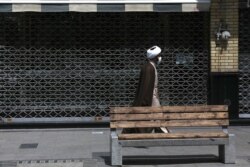With more than 135 million coronavirus cases and nearly 3 million deaths from the virus, according to the Johns Hopkins Coronavirus Research Center, signs of the virus’ fortitude and lockdown fatigue abound.
China said it is considering using vaccines developed in other countries in conjunction with vaccines developed in China to boost the efficacy of China’s vaccines.
A top Chinese health expert recently told a conference that public health officials must “consider ways to solve the issue that efficacy rates of existing vaccines are not high,” citing Gao Fu, the head of China’s Center for Disease Control and Prevention, according to The Paper, a Chinese media outlet, Agence France-Presse reported.
India reported 10,732 new COVID-19 cases Sunday in the previous 24-hour period. India trails the U.S. and Brazil in the number of coronavirus infections at 13.3 million cases. The U.S. has 31.1 million infections, while Brazil had 13.4 million.
The unsanitary conditions of America’s prisons, jails and detention centers have become a breeding ground for the spread of the coronavirus. More than 2,700 inmates have died in the facilities since March 2020, while over 525,000 of them have been infected, according to data compiled by The New York Times. “So, we’re basically just sitting back and biding our time until we get sick,” an inmate said in an email to the Times.
Iran began a 10-day lockdown Saturday to tame a fourth wave of coronavirus infections, while in Bucharest about 1,000 people marched in protest of COVID-19 restrictions and in Paris, more than 100 people were fined while eating at a restaurant that broke rules against large gatherings.
In Iran, more than 250 cities, including the capital, Tehran, have been declared red zones, meaning they have the highest coronavirus positivity rates and the most severe restrictions. More than 85% of Iran is in a red or orange zone, authorities said.
The surge in cases and deaths — more than 19,600 new infections Saturday and 193 deaths, according to the Health Ministry — comes after the Persian New Year, during which millions traveled, packed markets and partied in homes despite government guidelines.
According to the World Health Organization, so far about 200,000 doses of coronavirus vaccine have made it into the arms of a country of 84 million.
In Bucharest, protesters came to Victory Square and University Square Saturday to pushback against pandemic restrictions.
"We do not agree with compulsory vaccination, with wearing a mask on our faces … the quarantine of cities, online schooling, the closure of churches, playgrounds, restaurants and shops," Dumitru Balan, leader of the civic movement Action for the Nation, told The Associated Press.
That same day, Romania neared 1 million coronavirus infections and nearly 25,000 deaths, according to Johns Hopkins.
In France the Health Ministry announced that it will lengthen the time between the two shots of mRNA vaccines — the Pfizer-BioNTech and Moderna vaccines — to six weeks, instead of four weeks.
"[It] will allow us to vaccinate more quickly without reducing protection," Health Minister Olivier Veran told the JDD newspaper Sunday.
France’s vaccination rollout reached its target of 10 million first doses ahead of its mid-April target and aims to deliver another 10 million doses by mid-May.
France has registered more than 5 million coronavirus cases since the pandemic began and nearly 100,000 deaths, according to Johns Hopkins.
Meanwhile, clandestine restaurants, where wealthy diners enjoy caviar and champagne, have been in the headlines. In a Paris restaurant, more than 100 diners were fined, police said Saturday. The restaurant’s manager was arrested. In a second incident, more than 60 people were fined for dining indoors at lunch. All restaurants and cafes have been closed for indoor dining in France for five months.
Several nations have issued new guidelines over the use of AstraZeneca’s COVID-19 vaccine after the European Union’s medical regulator announced a link between the vaccine and the blood clots.
Britain, where the vaccine was developed jointly by the British-Swedish drugmaker and scientists at the University of Oxford, said it will offer alternatives for adults under 30. Oxford researchers have also suspended a clinical trial of the AstraZeneca vaccine involving young children and teenagers as British drug regulators conduct a safety review of the two-shot regimen.
Spain and the Philippines will limit the vaccine to people over 60 years old, Reuters reported, while The Washington Post reported Italy has issued similar guidelines.
The European Medicines Agency recently said blood clots should be listed as a very rare side effect of the AstraZeneca vaccine, but it continued to emphasize that its overall benefits outweigh any risks.
AstraZeneca has been the key vaccine in Britain’s exceptionally speedy inoculation campaign, which has outpaced the vaccination rates in the rest of Europe.
However, the vaccine has had a troubled rollout elsewhere, initially because of a lack of information from its late-stage clinical trials on its effect on older people, which has slowed vaccination efforts throughout Europe. Many nations stopped administering the AstraZeneca vaccine after reports first surfaced of the blood clot incidents.
After 34 million inoculations of the Astra Zeneca vaccine, the European Medicines Agency said it has received fewer than 200 reports about the rare brain blood clots.








